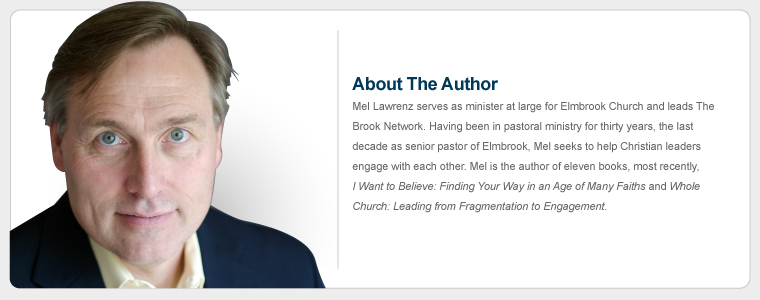

|
Having trouble seeing this email? View it online. |

|
|
Going Deeper in an Age of Information OverloadWe live in an age of information overload. Bombarded by messages on radio and television, billboards and magazine ads, phone mail, email, text messages, Facebook, and Twitter, each of our days is like crossing a river with a strong and unpredictable current. Shut your eyes and just think for a moment how many voices and messages are pounding their way into your eyes and ears. The messages contain truth and error, grace and malevolence, healing and hurting.
Marketers will do anything to get us to buy products. They play on our fears and insecurities and loneliness. Some journalists try their best to give facts, others are sloppy and lazy. Opinion makers go to extremes to get an audience, oftentimes resorting to extremes in order to get attention. What is really dangerous is that, for all the noise, sometimes we only hear the voices that are loudest. But volume does not equal veracity. Information overload is not making us go deeper. Life gets hacked up into tiny bits and pieces, hundreds of messages a day, none of which go very deep. When James wrote his New Testament epistle he was not contending with cable television, the internet, and smart phones. Which should perhaps cause us to listen all the more to his strong advice to focus on “the word,” to “look intently” into this “perfect law,” and to do it. This is a call for us to go deep, which is counter-cultural in this superficial age in which we live. “Do not merely listen to the word, and so deceive yourselves. Do what it says. Anyone who listens to the word but does not do what it says is like someone who looks at his face in a mirror and, after looking at himself, goes away and immediately forgets what he looks like. But whoever looks intently into the perfect law that gives freedom, and continues in it—not forgetting what they have heard, but doing it—they will be blessed in what they do.” (James 1:22-25) We all take a quick glance in the mirror here and there, like our quick glances at our emails and Facebook feeds. But if we do that with the word of God we will miss the life and light God has put there for us. To live the Bible, we have to let it penetrate our minds and hearts. A glance here and there, a verse quoted now and again, just cannot transport truth into us. So James charges his readers to “look intently into the perfect law that gives freedom.” To “look intently” means that we read Scripture in such a way that it enters us at a deep level, and it forms us. We read the newspaper for information; but we ought to read Scripture for formation. When we read information we pick and choose what is useful to us. The words are tools for us. But when we read the Bible, it should be with an attitude of submission to the Lord. We don’t stand over the text, we put ourselves under the text. The 18th century scholar Johann Albrecht Bengel put it this way: “Apply yourself wholly to the text; apply the text wholly to yourself.” In his book, Shaped by the Word, Robert Mulholland describes formational reading in these ways: —Formational reading is not concerned with quantity. —Informational reading is linear; formational reading is in depth. —Informational reading’s task is to master the text; formational reading’s purpose is for the text to master you. —With formational reading “instead of the text being an object we control… the text becomes the subject of the reading relationship; we are the object that is shaped by the text.” —“Instead of the analytical, critical, judgmental approach of informational reading, formational reading requires a humble, detached, willing, loving approach.” —Informational reading is problem solving; formational reading is openness to mystery. So we are to “look intently into the perfect law that gives freedom.” Like Jesus and like Paul, James carefully defines the law of God in its highest form as “perfect.” The hundreds of laws in the book of Moses served a certain purpose, but at the core was this “perfect” principle. A law of love and freedom. This motivates me to read Scripture intently, not superficially. We have the joy of discovering at one turn after another this core principle, this truth that echoes across the ages. God is good, and he has made it possible for us to live in that goodness, guided by a law of love and freedom. We can know this as certainly as anything else we are certain of in life. And then we must act on it. |
|
Resources
|
|

|
|
Subscription InfoYou received this newsletter because you signed for it on BibleGateway.com or one of its associated websites. Should you wish to unsubscribe for any reason, please click on the "Manage Subscriptions" link below. Clicking "One-click unsubscribe" will permanently unsubscribe you from all of our newsletters. If you encounter any problems while unsubscribing or have a different question, please visit our feedback page to let us know.
|
|
|
We respect your right to privacy - view our policy. Manage Subscriptions | Update Profile | One-Click Unsubscribe |


|

